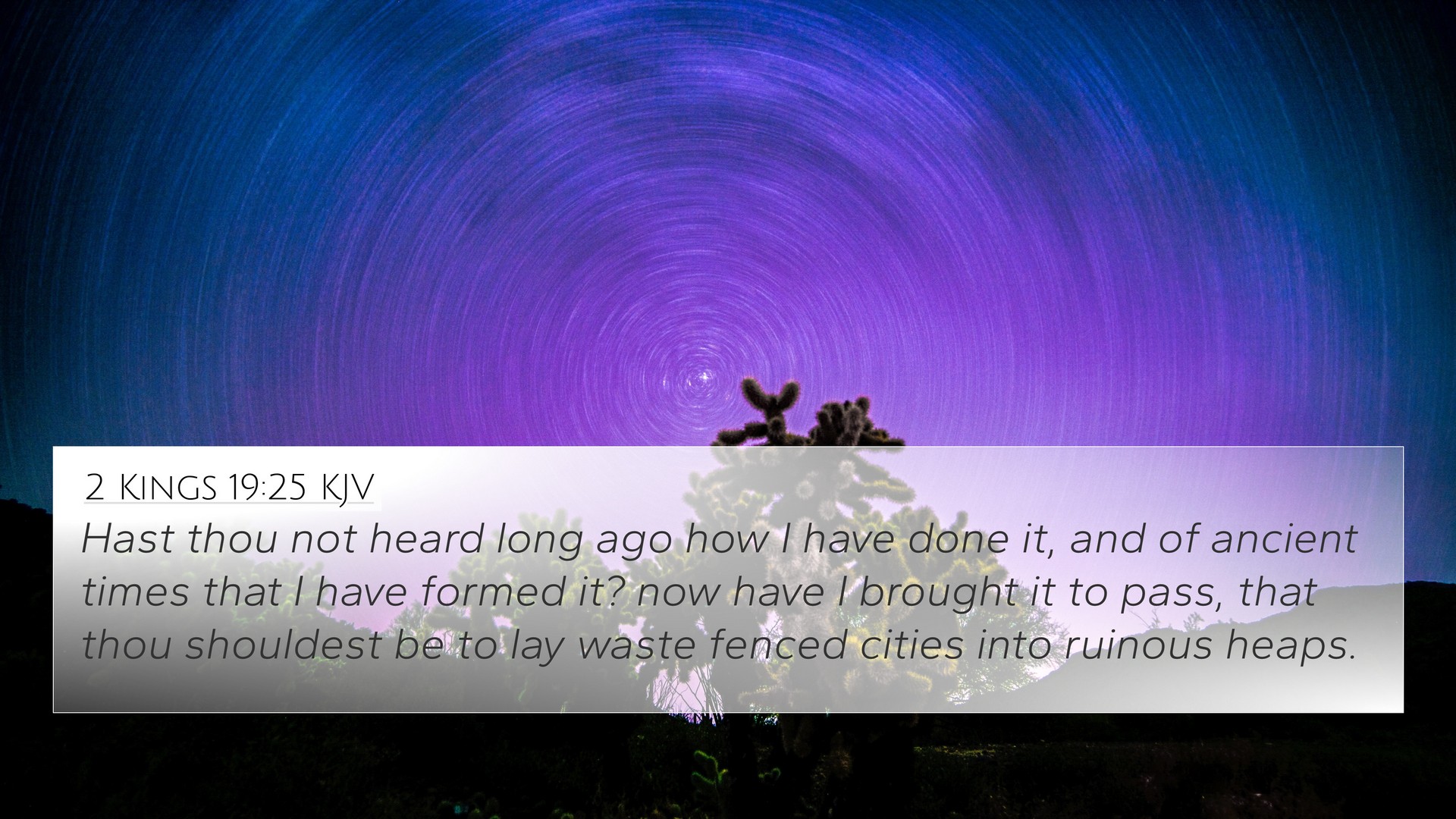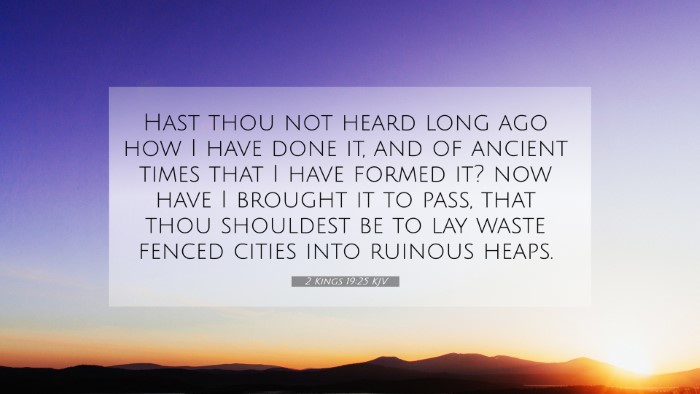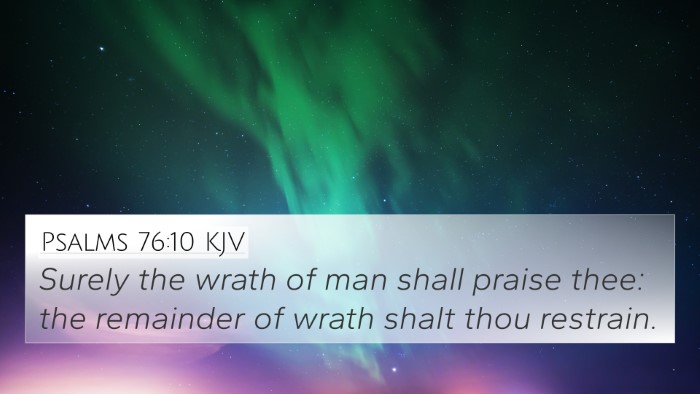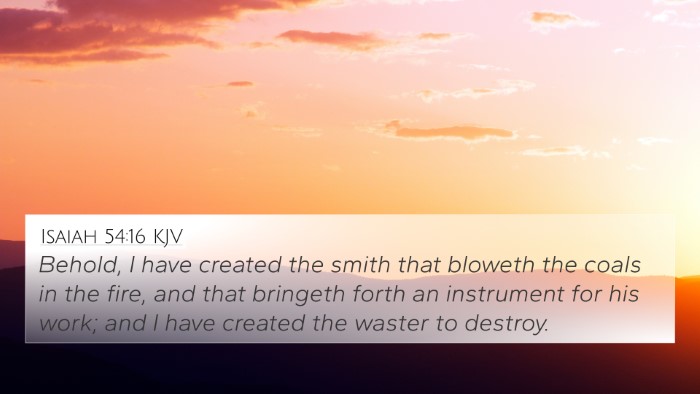Understanding 2 Kings 19:25
Bible Verse: 2 Kings 19:25 - "Hast thou not heard long ago how I have done it, and of ancient times that I have formed it? Now have I brought it to pass, that thou shouldest be to lay waste defended cities into ruinous heaps."
Meaning and Interpretation
This verse is part of a larger narrative where the Assyrian king Sennacherib taunts King Hezekiah of Judah, claiming invincibility due to his military conquests and the downfall of other nations before him. However, God responds powerfully, emphasizing His sovereignty over the events of history.
Insights from Commentaries
-
Matthew Henry:
Henry highlights the reminder of God's historic actions, illustrating that the Egyptians and other nations have fallen before Him. He draws attention to God's sovereignty and the meaning of divinely ordained events, stressing the futility of opposing God's will.
-
Albert Barnes:
Barnes elaborates on the phrase "hast thou not heard," suggesting that it serves as a challenge, reminding Sennacherib that the history of God's power was well-known and undeniable. Barnes discusses how God's past actions can inform His present intentions and His plans for the future.
-
Adam Clarke:
Clarke comments on the Assyrian's pride and presumption, linking it to a common theme of divine retribution against nations that oppose God. He explains that God uses historical events to fulfill His purpose, transforming the mightiest nations into ruins when they come against His chosen people.
Key Themes
This verse encompasses several critical biblical themes:
- Sovereignty of God: God is presented as having ultimate authority over nations and their leaders.
- Historical Context: God's past actions serve as a template for how He operates in the present and future.
- Divine Judgment: The verse foreshadows God's judgment against those who defy His will.
Bible Verse Cross-References
2 Kings 19:25 ties into several other scriptures, reflecting inter-Biblical dialogue that connects the themes of divine power and historical repercussions:
- Isaiah 14:24-27: Discusses God's intentions against nations; His plans cannot be thwarted.
- Isaiah 37:26: Reiterates God's foreknown actions against the Assyrians.
- Proverbs 21:30: No wisdom or understanding can prevail against the Lord.
- Psalms 33:10-11: The Lord nullifies the counsel of nations; His plans stand forever.
- Jeremiah 18:7-10: Depending on the people's behavior, God can change His plans towards nations.
- Romans 9:17: God raised Pharaoh for His purpose, echoing the theme of power and deliverance.
- Matthew 10:28: Encourages fearing God who has power over souls, stressing divine authority.
- Revelation 19:15: Illustrates the ultimate judgment of God over nations at the end of times.
Conclusion
2 Kings 19:25 presents a powerful reminder of God's governance over history, emphasizing His sovereignty and the consequences of opposition. Understanding this verse through the lens of various commentaries allows readers to grasp its depth and relevance. By cross-referencing related scriptures, one can see the recurring motifs of God's might and the inevitable downfall of those who defy Him.
Tools for Bible Cross-Referencing
For those interested in exploring these connections further, various resources can enhance understanding:
- Bible Concordance
- Bible Cross-Reference Guide
- Cross-Reference Bible Study Tools
- Bible Reference Resources
How to Use Bible Cross-References
Effective cross-referencing can involve:
- Identifying connections between Old and New Testament themes.
- Using a comprehensive Bible cross-reference system for deeper study.
- Exploring thematic Bible verse connections across different scriptures.
- Analyzing comparative studies of passages for insights into God's character.
Final Thoughts
2 Kings 19:25 and its surrounding context provide profound insights into God's interactions with humanity. By exploring this verse and its connections, one can cultivate a deeper faith and understanding of the biblical narrative.











